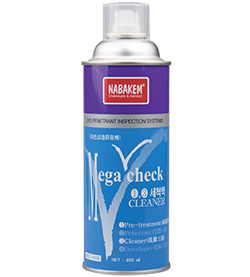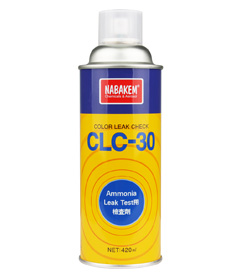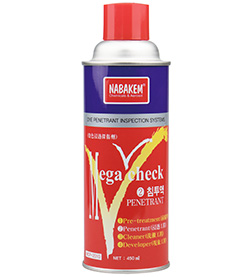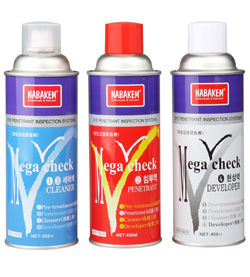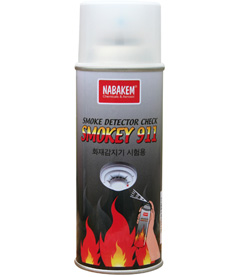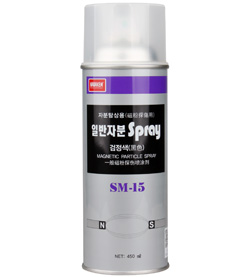Description
 |
| • Special equipment not required. Used anytime anywhere. Easy-to-use • This product changes invisible fine cracks into visible red-colored cracks, enabling you to check all cracks. • It can be used regardless of material or form of inspection object. • Easy-to-use and highly portable one touch aerosol type Corrosive materials not used. • Safe for aluminum alloy and magnesium alloy subject to easy corrosion. • Inspection results are maintained as they are, unless you clean them. • Aerosol product ensures clean use, making you maintain cleanliness of workplace. |
 |
| • It can be used for nonferrous materials like porcelain, glass, synthetic resin as well as metal, iron, nonferrous metal, magnetic substance and nonmagnetic substance. • Casting parts —– pin hole, scalding flaw, shrinkage flaw forging parts —– forging flaw • Weld —– crack, failed joining. • Metal materials —– grinding flaw, heat flaw, cutting tool crack • Leakage check —– tank, boiler, pipe etc. |
 |
| • Coloring Penetration Detection Method disovers invisible flaws easily by making red penetrant liquid penetrate into surface flaw areas of inspection object, removing residual red penetrant liquid with cleaner, and developing red penetrant in flaw areas by using white developer and capillary phenomenon. • Everyone can use the detection method by following operations. 1. Pre-treatment The dirt like dust, oil content, coating materials and rust prevents penetration of red penetrant. Remove them completely with cleaner before inspection. Be careful of pre-treatment method to prevent surface flaw areas from being clogged. The more perfect the pre-treatment is, the higher the detection effects are and the easier the inspection operations. 2. Penetration Clean the inspection object surface and dry it. Apply red penetrant evenly 20~30cm away from target object to make the surface covered with the penetrant. Penetration time is 2∼3 minutes. Application at the intervals of 3∼6 minutes ensures better effects. Recommended temperature of parts for inspection is about 10∼40℃. When you do this inspecton work outdoors in winter, it is recommended that you should lengthen penetration by about two times to obtain better penetration effects. (Also, as soluble penetrant is available, water rinsing is possible and onsite use is very easy.) 3. Cleaning After penetration treatment is done, remove red penetrant remained on the inspection object by using dry dustcloth, tissue paper, other absorbents or water rinsing (in case of soluble penetrant) and clean the object with dustcloth containing cleaner or tissue papers. If weld with surface not smoothed or inspection object with black flim of steel and casting products are not cleaned completely, and red penetrant is remained on their surfaces, it is difficult to determine flaws correctly in developing. Use white or near-white dustcloth or tissue paper to know cleaning degree easily. Do not apply it directly to the surface of inspection object. 4. Development After cleaning red penetrant remained after penetration, apply white developer evenly to make it cover whole surface. Applied white developer is dried immediately, showing white color. As it dries, red penetrant in flaw areas is absorbed and appeared, making the position and shape of flaw marked sharply on the white powder phase. Shake white developer light before use. 5. Inspection The areas not showing red after development means that they have no flaws. Determine the kinds, size and depth of redstained areas on the basis of their shape and size. The kinds of flaw created by color fixation can not be determined by a single word, but we can show them as following.
|
 |
| • Keep it away from your children. • This flammable product uses high-pressure gas. Comply with following cautions. 1 .Do not use it toward fire. 2. Do not use near heater or stove. 3. Do not use in the room using fire. 4. Do not keep it in the place above 40℃. 5. Provide ventilation to use it in the closed room. 6. Do not throw it away into fire. 7. Punch the can to throw it away. 8. Do not keep it in the closed place. 9. Spraying may not work well below 5℃. |




